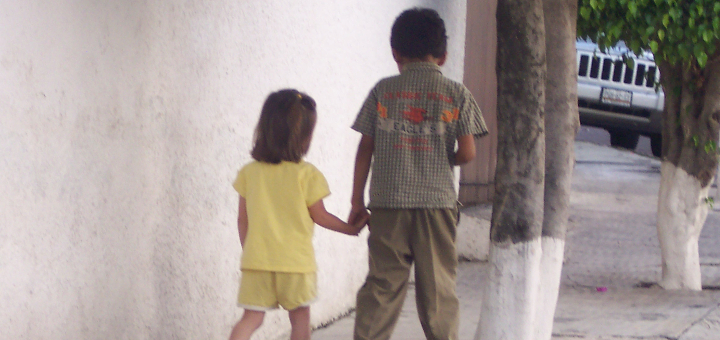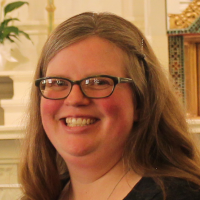
 Copyright 2019 Amanda Villagómez. All rights reserved.[/caption]
This month I continue the conversation in my Walking Well series focusing on how educational pedagogy can inform the process of evangelization. I love language and culture, so as a future educator, I was naturally drawn towards bilingual education as I started my educational coursework. Over time, my interests have narrowed in on literacy instruction that is facilitated in a culturally responsive and equitable manner. Jean Piaget’s theory of constructivism was one of the first theories I learned. It continues to impact my practice, and I integrate it into my university level literacy coursework for future and current teachers.
Piaget focused on the process of constructing knowledge over time through experiences and interactions. He explained that our brains develop schemes and we process new information in relation to how it fits with existing information. Assimilation occurs when we apply existing knowledge to new concepts, and accommodation occurs if we need to modify our thinking in light of new learnings. As our brain tries to connect or reconcile new information with prior knowledge we experience a sense of disequilibrium or an imbalance when concepts do not seem to fit together. That can be unsettling and uncomfortable, so we naturally seek to regain a sense of balance, which is referred to as equilibrium. When we are able to step back from the discomfort, we can view the learning process from a lens of adventure full of opportunities to stretch and grow in new ways.
Copyright 2019 Amanda Villagómez. All rights reserved.[/caption]
This month I continue the conversation in my Walking Well series focusing on how educational pedagogy can inform the process of evangelization. I love language and culture, so as a future educator, I was naturally drawn towards bilingual education as I started my educational coursework. Over time, my interests have narrowed in on literacy instruction that is facilitated in a culturally responsive and equitable manner. Jean Piaget’s theory of constructivism was one of the first theories I learned. It continues to impact my practice, and I integrate it into my university level literacy coursework for future and current teachers.
Piaget focused on the process of constructing knowledge over time through experiences and interactions. He explained that our brains develop schemes and we process new information in relation to how it fits with existing information. Assimilation occurs when we apply existing knowledge to new concepts, and accommodation occurs if we need to modify our thinking in light of new learnings. As our brain tries to connect or reconcile new information with prior knowledge we experience a sense of disequilibrium or an imbalance when concepts do not seem to fit together. That can be unsettling and uncomfortable, so we naturally seek to regain a sense of balance, which is referred to as equilibrium. When we are able to step back from the discomfort, we can view the learning process from a lens of adventure full of opportunities to stretch and grow in new ways.
 Copyright 2019 Amanda Villagómez. All rights reserved.[/caption]
Within an evangelization context, understanding Piaget’s constructivist theory and natural human tendencies towards the learning process can assist us in walking alongside others as they grow in the faith. First, we can remember that it is a process and to be patient in order to allow people to take the time they need to negotiate the different layers of cognition involved with processing new information in relation to previous understandings. We can recognize that it is helpful to understand where they are coming from and reflect on whether the concepts we are teaching are in close alignment or if they will prompt tensions, in which case, we need to allow extra space to negotiate those conflicting pieces of information.
We can recognize that the process will include moments of comfort, as well as those of discomfort and encourage others to expect this as part of the way learning occurs naturally. By understanding this, we can encourage receptivity as people learn to adjust their expectations and work towards being able to celebrate the process of growth, rather than resist the tensions that can occur along the way. We can help orient others towards viewing spiritual growth with a sense of inquiry and adventure.
This understanding of the construction of knowledge can also remind us that because it involves individuals with different schemas based on previous experiences and opportunities to learn, we need to anticipate individualized journeys. Though we can come to recognize trends over time the more experience we have, we can resist the tendency to compare journeys in order to celebrate the beauty of becoming as unique stories that unfold over time in both expected and unexpected ways. This helps to open hearts to God’s will for their lives, rather than being attached to their own expectations, assumptions, plans, and dreams.
Copyright 2019 Amanda Villagómez. All rights reserved.[/caption]
Within an evangelization context, understanding Piaget’s constructivist theory and natural human tendencies towards the learning process can assist us in walking alongside others as they grow in the faith. First, we can remember that it is a process and to be patient in order to allow people to take the time they need to negotiate the different layers of cognition involved with processing new information in relation to previous understandings. We can recognize that it is helpful to understand where they are coming from and reflect on whether the concepts we are teaching are in close alignment or if they will prompt tensions, in which case, we need to allow extra space to negotiate those conflicting pieces of information.
We can recognize that the process will include moments of comfort, as well as those of discomfort and encourage others to expect this as part of the way learning occurs naturally. By understanding this, we can encourage receptivity as people learn to adjust their expectations and work towards being able to celebrate the process of growth, rather than resist the tensions that can occur along the way. We can help orient others towards viewing spiritual growth with a sense of inquiry and adventure.
This understanding of the construction of knowledge can also remind us that because it involves individuals with different schemas based on previous experiences and opportunities to learn, we need to anticipate individualized journeys. Though we can come to recognize trends over time the more experience we have, we can resist the tendency to compare journeys in order to celebrate the beauty of becoming as unique stories that unfold over time in both expected and unexpected ways. This helps to open hearts to God’s will for their lives, rather than being attached to their own expectations, assumptions, plans, and dreams.
 Copyright 2019 Amanda Villagómez. All rights reserved.[/caption]
The gospels help to highlight different journeys. In Luke 1:42-44 we see an example of instantaneous revelation as Elizabeth states, “Most blessed are you among women, and blessed is the fruit of your womb. And how does this happen to me, that the mother of my Lord should come to me? For at the moment the sound of your greeting reached my ears, the infant in my womb leaped for joy.” In contrast, in John 6:69 Peter uses the words, “We have come to believe and are convinced,” which points towards a process of deepening understanding over time based on a foundation of experiences living alongside Jesus to arrive at his understanding of who Jesus was. We can also consider Thomas’ journey towards belief that Jesus had resurrected (John 20:25-28), which included Jesus inviting Thomas to put his hand into his side, allowing him the space and means he needed to have a deep understanding.
Copyright 2019 Amanda Villagómez. All rights reserved.[/caption]
The gospels help to highlight different journeys. In Luke 1:42-44 we see an example of instantaneous revelation as Elizabeth states, “Most blessed are you among women, and blessed is the fruit of your womb. And how does this happen to me, that the mother of my Lord should come to me? For at the moment the sound of your greeting reached my ears, the infant in my womb leaped for joy.” In contrast, in John 6:69 Peter uses the words, “We have come to believe and are convinced,” which points towards a process of deepening understanding over time based on a foundation of experiences living alongside Jesus to arrive at his understanding of who Jesus was. We can also consider Thomas’ journey towards belief that Jesus had resurrected (John 20:25-28), which included Jesus inviting Thomas to put his hand into his side, allowing him the space and means he needed to have a deep understanding.
Loving Lord, You know us perfectly and understand exactly what we need in order to progress on our journeys toward You. Thank You for Your love, patience, and tenderness. Please help us to rely on You and trust in the process as we walk alongside others, guided by Your grace. Amen.
Copyright 2019 Amanda Villagómez
About the Author

Amanda Villagómez
Amanda Villagómez is a wife, mom of 6, and teacher educator. On her personal site, she focuses on the beauty of becoming who God created us to be by celebrating the process of change and growth.


.png?width=1806&height=731&name=CatholicMom_hcfm_logo1_pos_871c_2728c%20(002).png)
Comments